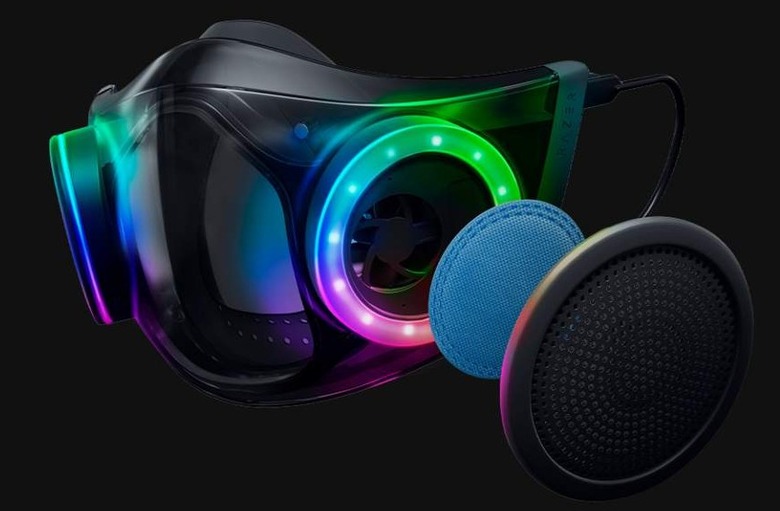The Razer Zephyr Made Claims It Can't Back Up
Razer is best known for its gaming-centric computer products, but it has also been making headlines for some of its more unorthodox ideas. One, in particular, didn't have anything to do with gaming directly but was more timely and relevant than any of its other products. Unlike its past concept designs, Project Hazel went on to become the Zephyr mask due to popular demand. Ironically, its popularity is now waning because of Razer's misleading and potentially harmful marketing.
Truth be told, it did sound too good to be true that the Razer Zephyr would qualify as an N95 mask. The technical wording originally used for the product was that the mask's replaceable filters are "N95 grade." The Zephyr's RGB lights and cyberpunk vibe, meanwhile, are the hooks to reel in gamers and tech aficionados alike.
Unfortunately, that wording has become problematic and is now causing Razer some PR headaches. Regardless of how carefully worded it is, some people will interpret "N95 grade" as simply "N95" and expect Zephyr to meet those protection standards. In technical, medical, and even legal terms, however, Razer is walking a very thin line between marketing and misleading consumers.
The company is clearly aware of these concerns because, as reported by PCMag, it recently updated its "Science Behind" page to remove almost all references to N95 filters. In fact, the page now mentions that the Zephyr and Zephyr Pro are not N95 masks and should not be used in settings where these high-quality medical masks are needed. The page likewise now says that Razer took guidance from regulatory agencies, leaving out any implication that the masks are certified at all.

The problem is that this change of wording comes months after the Razer Zephyr hit hit the market. Although it is debatable whether the filters do provide some level of protection, the reality is the product doesn't afford the protection the company had advertised. While it is questionable whether anyone will actually risk using this gaming-themed mask in clinical and industrial settings, it doesn't absolve Razer of any guilt for using terms that could mislead consumers, then underdelivering on those claims.
Quietly changing its words aside, Razer has yet to respond to the sudden U-turn in people's assessment of the Zephyr mask. While it was previously highly regarded for mixing safety and design, the mask is quickly becoming yet another anecdote on how some companies play with words in pursuit of a profit.
Updated with official statement from Razer.
Razer would like to clarify that while the filters used in the Razer Zephyr Wearable Air Purifier have been tested for 95% Particulate Filtration Efficiency (PFE) and 99% Bacterial Filtration Efficiency (BFE), per the statements on the website and documentation for the product, the wearable by itself is not a medical device nor certified as an N95 mask.To avoid any confusion, we are in the process of removing all references to "N95 Grade Filter" from our marketing material. We will also directly reach out shortly to existing customers to clarify. Customers with any further questions about the Razer Zephyr Wearable Air Purifier should contact our Customer Service at https://support.razer.com/.
